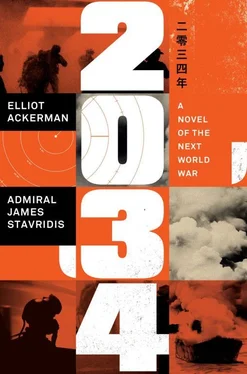When Bagheri stepped off the ramp, he walked with his arm extended, as if the congratulatory handshake he offered to Farshad had lured his entire body from Tehran. “Fine work,” Bagheri muttered. The radius of his congratulations spread wider as he trooped the line, clasping the shoulder of every soldier who came within reach. Only when a member of Bagheri’s staff handed out challenge coins did the befuddled conscripts realize they’d met the chief of staff of the armed forces.
General Bagheri and Farshad retired to the “command post.” They sat on the lip of Farshad’s hole, staring out into the spongy darkness. “Did they land over there?” asked General Bagheri, pointing in a vague direction, to where the night hid the thousands of parachutes littered over the surface of the water.
Farshad nodded.
General Bagheri gave a belly laugh. “You are the embodiment of Napoléon’s most famous maxim. Do you recall it?” Farshad shook his head. Not because he didn’t know the maxim (which he did), but because he didn’t care. He could feel himself struggling to stay awake. General Bagheri prattled on, “When it comes to a general, Napoléon said, ‘I would rather have one who is lucky than good.’”
Farshad leaned his head all the way back, his face flush with the stars. He felt a slight spasm through his body, as one feels when dozing off in a dull movie. General Bagheri continued to speak. His voice—and its message—only partly registered to Farshad as he listed further and further toward sleep. Bagheri was stumbling through a half-hearted apology, in which he conceded that he hadn’t believed Farshad’s report about the threat to these islands but in which he also congratulated himself for possessing the intuition to send Farshad to command the garrison. Farshad propped his elbows on his knees and cradled his head in his palms. General Bagheri didn’t seem to notice, continuing to heap praise not on Farshad himself but on his remarkable luck. The importance of this victory over the Russians couldn’t be overstated, explained General Bagheri. It would unite the nation and the nation would, of course, again recognize Farshad with the Order of the Fath. Schoolchildren would learn his name, which shouldn’t be that of a lowly naval officer. No, this wouldn’t do. General Bagheri then confided to Farshad that his staff had already begun to process the required paperwork to have Farshad reinstated to the Revolutionary Guards and, perhaps, even promoted.
This woke Farshad up. “You’ll do no such thing.”
“And why not?” asked General Bagheri, whose tone wasn’t anger but bewilderment. “Your country needs to honor you. You must let it. Is there some other distinction you would prefer? Say the word and, believe me, it will be yours.”
Farshad could see that General Bagheri was telling the truth. This was Farshad’s moment to ask for what he truly wanted. And why shouldn’t he? He’d given his country so much, everything in fact. From his father’s assassination, to his mother’s grief and death thereafter, to his own adult life spread across so many wars, everything he’d ever had or could have hoped to have had been laid on the same altar.
“What is it?” General Bagheri repeated. “What is it that you want?”
“I think,” said Farshad sleepily, “that I just want to go home.”
“Home?… You can’t go home. There’s work to be done. Your reinstatement must be accepted… then there’s a new command to discuss… I have certain ideas…” As General Bagheri spoke, the sound of his words receded, as if he were speaking at the distant end of a tunnel down which Farshad had begun to travel. Farshad had stopped trying to remain awake. He leaned onto his side in the dirt, tucked his knees to his chest, and with a rock for a pillow drifted into the sweetest sleep he had ever known.

18:57 July 30, 2034 (GMT+8)
28°22’41”N 124°58’13”E
“Blue Leader, this is Red Leader; acknowledge arrival at release point.”
“Roger, Red Leader. This is Blue Leader. We’ve arrived.”
“Good copy, Blue Leader…. Gold Leader, this is Red Leader; acknowledge arrival at release point.”
“Roger, Red Leader. This is Gold Leader. Arrival acknowledged.”
“Good copy, Gold Leader…. Red Leader confirms all flights in orbit at release point.” Wedge checked his watch. They were right on time. According to plan, they’d hold at the release point for five additional minutes. This would be his last communications window with the Enterprise . After that they’d go dark.
Wedge then glanced below, to the vast expanse of ocean beneath his wing.
The day was bright and clear, with perfect visibility.
The conditions were ideal for him to see the column of smoke corkscrewing toward him from the water’s surface.

07:04 July 30, 2034 (GMT-4)
Washington, D.C.
“God help you if you’re wrong.”
That’s all Wisecarver could say as Hendrickson was joined by Chowdhury in the Situation Room. The three of them sat at one end of the table while a single staffer dialed INDOPACOM and the Enterprise for an emergency video teleconference. The president waited in the Oval Office, while the White House operator scoured the switchboard for a direct line to the Indian prime minister.

07:17 July 30, 2034 (GMT+8)
Beijing
When Lin Bao arrived at the ministry, the lights in the conference room were out. Surprised, he switched them on one at a time and began to poke his head into the adjacent offices, trying to find his support staff, that platoon of junior officers who set up his video teleconferences, his live drone feeds, his numerous secure calls.
They were nowhere to be found.
Stillness pervaded the large, empty rooms. Not sure what to do, Lin Bao installed himself at the head of the table. With perfect timing, the phone next to him rang. He startled. He would have been embarrassed if someone had been there to see him. Then the thought occurred that perhaps he was being watched. Putting this thought from his mind, he picked up the phone.
It was Zhao Leji: “No doubt you’ve heard the news.”
The attack on the Zheng He was part of the American response to Galveston and San Diego, replied Lin Bao. Sinking the Zheng He demanded a reprisal. However, Lin Bao cautioned, it should be proportional. Perhaps they could use their surface-based missiles to strike at American interests in Japan or the Philippines. Such a response would be immediate. Also, there was always the opportunity to launch another cyberattack, perhaps this time against more critical US infrastructure, like their electrical grid, or water system. “There are many options,” Lin Bao explained. “The key is that our response to the Americans be carefully considered.”
The line went silent.
“Hello?” said Lin Bao.
A sigh. Then, “The Americans didn’t do this.”
Now it was Lin Bao’s end of the line that went silent.
Zhao Leji added, “It was the Indians who sunk the Zheng He. ”
“The Indians?” Lin Bao’s mind went blank. “But… why would the Indians…” He struggled to find the right words. “They’ve allied themselves with the Americans?” Lin Bao had already begun placing one alliance against another as though canceling out the numerators and denominators in a complex equation whose solution would solve for how the American-Indian alliance might shift the global balance of power. “This doesn’t change anything with the Russians… nor the Iranians…. With the Indians in play we will, of course, need to keep the Pakistanis in check….”
Читать дальше













